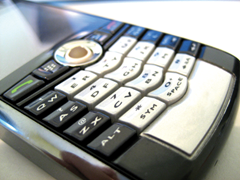Next generation mobile auction
 The mobile phone spectrum to facilitate faster smartphone technology will be auctioned in 2012. Stephen Dineen reports.
The mobile phone spectrum to facilitate faster smartphone technology will be auctioned in 2012. Stephen Dineen reports.
The largest ever auction of mobile phone spectrum has been delayed, and is now likely to happen in the second quarter of 2012 at the earliest, paving the way for the advent of fourth generation mobile phone technology. The spectrum to be purchased by the mobile phone network operators will be needed to deliver demand for mobile broadband services on smartphones, which are becoming increasingly popular. Twenty-three per cent of Northern Ireland mobile phone users use a smartphone.
Auctioning of fourth generation (4G) licences was expected to happen early in 2012 but has been delayed reportedly because of threatened legal challenges by some of the larger mobile phone operators to Ofcom’s proposed auctioning terms.
Currently, there are four mobile phone operators in the UK: O2, Vodafone, Everything Everywhere (T-Mobile-Orange) and Three. Three, however, has less spectrum capacity to carry data traffic than the other companies. Furthermore, in January Ofcom gave the other companies permission to reallocate spare spectrum from phone calls to data activities. The auction will represent 25 per cent of the total spectrum (the airwaves that carry information between mobile handsets and the internet).
There has been a massive increase in the demand for mobile broadband data services such as video streaming, email, social networking and mapping services. The issue is also relevant to the Government’s commitment to providing universal access to broadband by 2015 (see page 56). With fibre and copper broadband unlikely to provide universal broadband access, 4G technology will become more important. Northern Ireland has 100 per cent broadband access and 75 per cent penetration (74 per cent in the UK).
Ofcom’s Communications Market Report for Northern Ireland, published in August, revealed that 92 per cent of people in the province use a mobile phone (the highest proportion in the UK), with 23 per cent of mobile users using smartphones (30 per cent in the UK). Thirty-seven per cent of 16-34 year olds in Northern Ireland have smartphones. Smartphone users in the UK are more likely to use the devices for phone calls every day (81 per cent) compared to regular users (53 per cent).
The report also showed that only 54 per cent of people in Northern Ireland live in a postcode area with good 3G coverage from at least one operator. This is the lowest rate in the UK.
Auction of the 4G licences will involve the sale of 80 per cent more spectrum than the third generation auction in 2000.
Ofcom research published in May showed that 4G mobile technology will deliver more than 200 per cent of the capacity of existing 3G technologies, using the same amount of spectrum. Users, for example, will be able to download a video in a third of the time it takes today on a 3G network. By 2020 it is expected to be five and a half times more efficient. It also found that 4G technologies on its own will not be sufficient to meet the expected growth in demand for mobile data.
In its consultation document on the auction published in March, Ofcom proposed establishing maximum and minimum limits to the amount of spectrum bidders can win by disregarding any auction outcomes in which four companies do not win the minimum amount of spectrum necessary to provide quality data services.
Ofcom also wanted to set a maximum limit to how much spectrum one company could gain, as well as an obligation in one licence for the 800 MHz spectrum to provide mobile broadband service covering 95 per cent of the UK population. It proposed to supplement this with a requirement to cover a certain proportion of the population in rural areas.
The regulator expects 4G services to be widely available across the UK a few years after roll-out in 2013.





